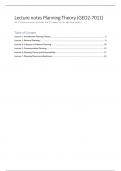Lecture notes Planning Theory (GEO2-7011)
All (7) lecture notes up until the 4 t h week, so for the first exam
Table of Content
Lecture 1: Introduction Planning Theory ................................................................................................. 2
Lecture 3: Rational Planning .................................................................................................................... 6
Lecture 4: Critiques on Rational Planning ............................................................................................. 10
Lecture 5: Communicative Planning ...................................................................................................... 13
Lecture 6: Planning Theory and Sustainability ...................................................................................... 17
Lecture 7: Planning Theory and Resilience............................................................................................ 22
,Lecture 1: Introduction Planning Theory
Readings:
- Fainstein, S., & Defilipps, J. (2016). Introduction: The structure and debates of planning
theory. In S. Fainstein & J. Defilipps (Eds.). Readings in Planning Theory (4th ed., pp. 1-18).
Wiley
- Friedmann, J. (2003). Why do planning theory?. Planning theory, 2(1), 7-10.
What is planning?
- Planning is a ‘common sense proposition’ (Beauregard, 2020) > everybody plans
- Planning is a future-oriented activity: a process by which we attempt to shape the future
- A wide definition can be of planning as decision-making in the public sector concerning
allocating and distributing public resources
- Planning in the public domain is a complex process: it often entails contestation,
contradictory visions of the world, problems, of how problems should be solved, etc.
What does planning do?
1. It deals with controversial problems
2. It deals with complex decisions
(housing affordable or let market decide; maintenance collectively or privately)
What do planning theorists do?
- They study the interplay of the technical, political, and ethical issues circulating through the
various planning processes
- They think about the appropriate way to plan
- They reflect on what planners do (or should do) using the lenses of the social sciences, the
natural sciences, and political philosophy
What is planning theory?
- This is a difficult question, because it is characterized by fragmentation and diversification
- Simple definition: planning theory is the body of scientific concepts, definitions, and
assumptions that define the body of knowledge of urban planning
- It is an illusion that there is a certain coherence of planning theory. It is not all-encompassing.
There are competing theories that provide contradictory guidance for planning
A step back: what is theory?
- Simple definition: a wide range of ideas or propositions systematized to explain a certain
phenomenon or to give directions to its evolution based on empirical reality
- Theory in social science:
o It is a socially constructed knowledge
o There is a certain relativism in theories in social sciences: different theories exist side
by side
Theories propose perspectives and provide limited answers.
- Each theory provides a specific perspective and set of explanations of an urban planning-
related problem and phenomenon. Still, if we only stick to one theory, we risk missing out on
other important dimensions.
o For example: Marxist theories of urbanization help us interpret urban phenomenon
by understanding the workings of the capital, and how this capital is spatialized, but
often don’t provide guidance for action
, - We should consider the different planning theories as lenses, through which we can see
different aspects or ways of dealing with planning problems – but also different conceptions
of how the world should be.
Why do we not have an unifying planning theory?
1. Planning theorists disagree on what aspects of planning matter and which theoretical
perspectives are most appropriate. What is considered appropriate in one theory, might not
be in another.
2. Planning theories can have different focuses and can be of different types (Friedmann):
a. Theories in planning (substantive theories, Faludi): they focus on different
objects/areas of planning (e.g. land use, transport, urban design, regional
development, etc.)
b. Theories of planning (procedural theories, Faludi): they focus on the process of
planning, methods of planning (e.g. the process of decision-making in spatial
development)
c. Theories for/about planning (normative theories): focus on what ends ought
planning to be - the different goals of planning (e.g. theories of the public good,
social justice)
Modern and postmodern theories:
Modernism Post-modernism
Universal truth Contextual truths
Foundational Anti-foundational
Dualities Non-dualistic
Unity Plurality and difference
Objective Objectivity does not exist
Scientific method Hermeneutics
Certainty Uncertainty
Modernism:
- Emerged as alternative to "traditional" social organization
- Seeking a "rational form of social organisation and rational modes of thought [which]
promised liberation from the irrationalities of myth, religion, superstition, release from the
arbitrary use of power as well as from the dark side of our human natures" (Harvey, 1990:12)
- Basis in enlightment idea of liberty through knowledge and principles including: reason,
empiricism, science, universalism, tolerance, freedom, secularism, individualism, uniformity
of human nature (Hamilton, 1992:21)
- Modernist ideals: progress, order, economies of scale, mass production




